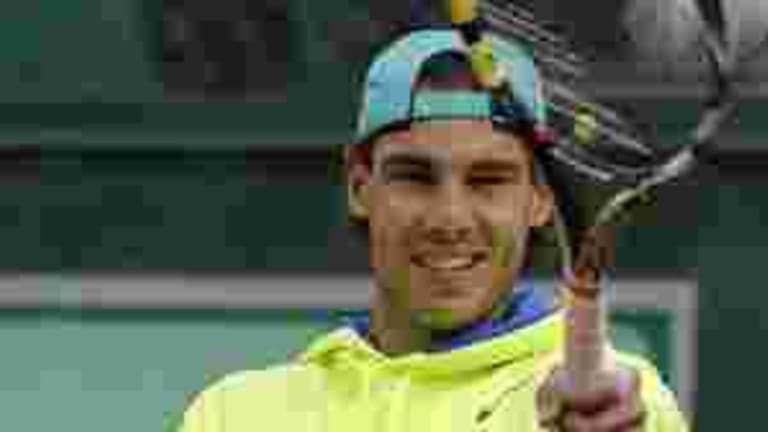Furthermore, Toni acts as a mentor to Nadal in ways a father simply cannot. The term mentor originates with the ancient Greek character by the same name; “Mentor” was the wise and loyal advisor assigned to protect Odysseus’ son in Homer’s Odyssey. Modern psychological study has recently proved what Athena and the ancient Greeks knew all along: It’s important to have parents and mentors! There are lots of reasons for this, but a crucial one is that mentors help deflect the deadly heat of Oedipal competition. Competitive desires can be pretty scary to kids, particularly to remarkably gifted kids who might worry about outshining their parents. It doesn’t require much stretch of the imagination to picture Rafa as one of those kids.
You mentioned the term “Oedipal victory” in reference to Rafa’s relationship with his father Sebastian. Yes, you’re right, Oedipal victory can be understood as a father not blocking his son’s way. But it also has a darker side. If the son surpasses the father at too young an age, before he is truly prepared to take on the grown-up tasks that come with triumph, the victory will come back to haunt him. Even if this victory exists primarily in the mind of the child, it can be deeply disturbing. If you’re 12 years old and you’ve already “defeated” your father, who can possibly protect you from attack?
From an outsider’s perspective, it seems that Toni Nadal, as Rafa’s mentor, functions as a guide, but also as a kind of displaced target for the ferocity of Rafa’s competitive drive—as a buffer for Rafa’s relationship with his father. In an illuminating passage in RAFA, a young Rafael is bereft over losing a tennis match he feels he ought to have won:
"On the way back home in the car I was deathly silent. My father, who’d never seen me so gloomy, tried to cheer me up. He said, “Come on. It’s not such a big deal. Don’t feel bad. You can’t always win.” I said nothing.… He insisted. “Come on, you’ve had a terrific summer. Why’s that not enough?” “Yes, Dad,” I replied, “but all the fun I had then can’t make up for the pain I’m feeling right now. I never want to feel this way again.” (p. 45)
Nadal goes on to say that his father retells that conversation to this day, and I can well imagine Sebastian Nadal, quietly driving along, wondering how the hell he got such a force of nature for a son. But because Toni Nadal is also so close to Rafa, yet not his father (and thus also not the root source of Rafa’s “deathly” Oedipal impulses), Toni is available to bear the brunt of Rafa’s competitive force.
So all this sounds pretty good, right? And it is. From a psychologists’ perspective, there’s a lot to like about the interdependent Rafa-Toni pairing. But where there are strengths, there are also struggles; which brings us to your superego question, Steve.
Yes, for better and for worse, Toni seems to function as a kind of looming superego enforcer for Rafa. One function of the super-ego is to protect the ego (the “self”) from pain at all costs. The young Rafa says, “all the fun I had then can’t make up for the pain I’m feeling right now. I never want to feel this way again…” Well, this is essentially a superego statement. The lesson is ‘discipline will prevent pain.’ Or rather, controlled self-inflicted pain protects against the uncontrollable pain of loss. And really, in tennis, this is true!
Toni reinforces this dictum with his insistence on humility at all costs. The message being, ‘A lack of humility will cost you everything.’ (I’d hazard a guess that thinking of himself as “the favorite” in a tournament might equate with “fun” in Rafa’s lexicon.) But before you feel too sorry for the hardworking Rafa, another task hyper-muscular superegos are really good at is cruelty. There is nothing like a dominant superego to teach a person the soul-killing power of subjugating another. RAFA tells us of a tennis training game Uncle Toni used to play with his nephew in which the first person to reach 20 points was the winner. Toni would let an excited young Rafa get all the way to 19 before stealing the game away from him. Sound familiar?
How many times have we seen Rafa play defense for 10, 12, 19 strokes, lulling his opponent into a false sense of safety, before breaking his competitor’s spirit with an off-the-back-foot wrist-snapping forehand pass? Superego tennis at its best.
But is it healthy? A healthy superego is psychologically protective. An overdeveloped one is self-destructive. Is what’s good for the tennis good for the man? This is a question only Rafael Nadal can answer, and probably will answer many different ways over many years time. Tennis careers are short, but the individuation process lasts a lifetime. For the rest of us, our opinions are likely say far more about our own questions and answers. But so far as Nadal’s tennis is concerned? Well, that speaks for itself.
